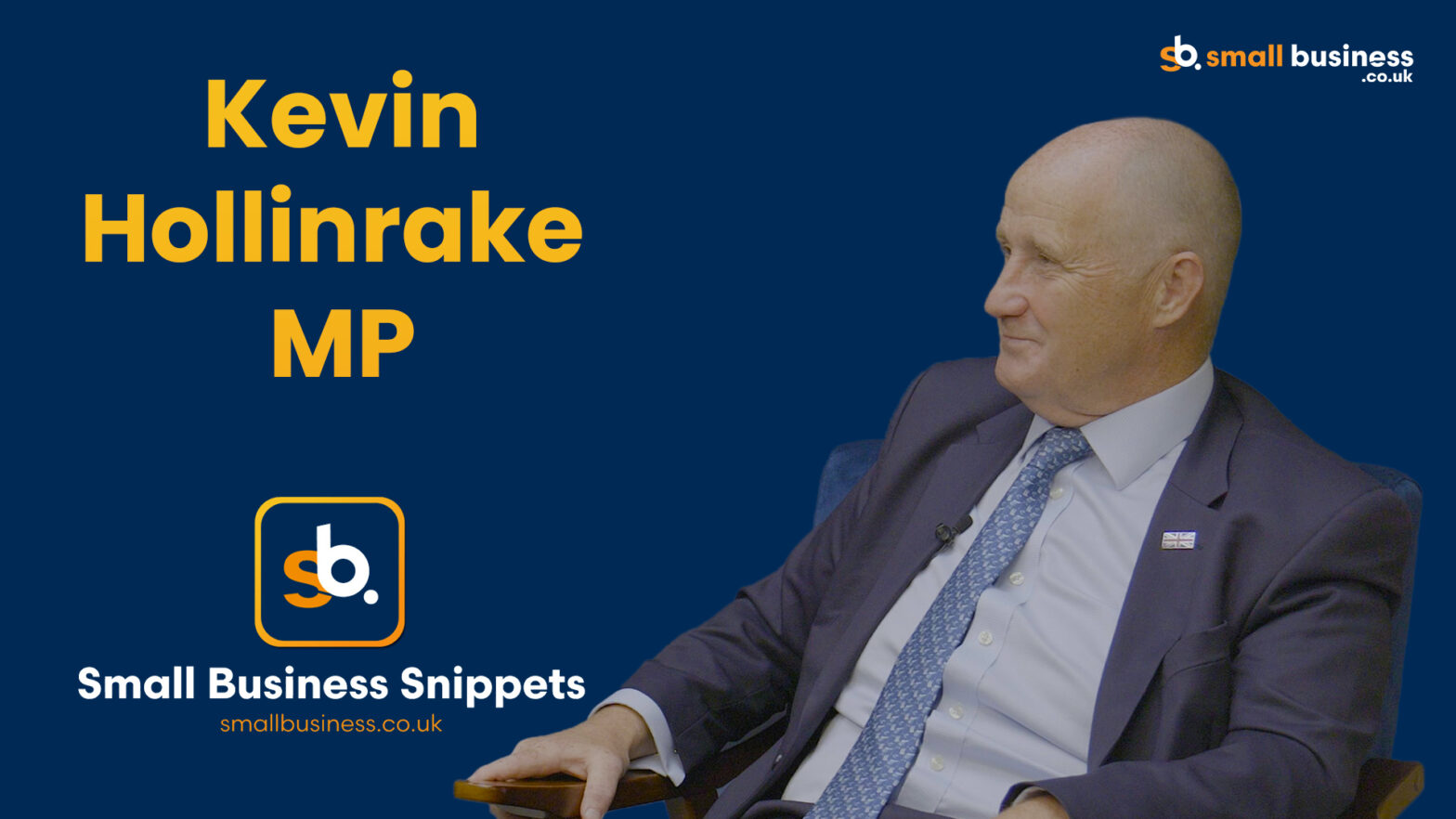Welcome to Small Business Snippets, the podcast from SmallBusiness.co.uk. Today’s guest is Gerald Ratner, author, motivational speaker and businessman.
We discuss the decline of the high street and how Gerald reinvented himself after one of the biggest setbacks of his career.
Listen to it in the media player below.
You can also catch our episodes with:
- Entrepreneur and TV presenter, Trinny Woodall
- Pub owner and bartender on Channel 4’s First Dates, Merlin Griffiths
- Founder and chairman of Pimlico (formerly Pimlico Plumbers), Charlie Mullins
- Retail expert and former Dragon, Theo Paphitis
- Author and boardroom expert, John Tusa
- Digital guru and investor, Sherry Coutu
- Entrepreneur and former Dragon, Rachel Elnaugh
- Businesswoman and Dragon, Deborah Meaden
- Entrepreneur and The Apprentice 2005 candidate, Tim Campbell
- Gousto CEO, Timo Boldt
- Entrepreneur and The Apprentice 2018 candidate, Jackie Fast
- Investor and former Dragon, Piers Linney
- Investment fund manager, Nicola Horlick
- Supermodel turned entrepreneur, Caprice
We’ve got podcast episodes from the first series looking at:
- How one business owner’s mental breakdown caused her to see trolls from her past
- How one entrepreneur hired a videographer to track their every move and build their business brand
- How funding a business led one entrepreneur to stress-related alopecia
- One entrepreneur’s first professional public speaking engagement
- Adapting to UK life and learning English before starting a business
- Securing seed funding
- Finding the perfect head of customer care
- Reaching a £1 million annual rate of return
- Boosting client numbers from 30 to 850
- Starting a brand new business from scratch
To find out more about Small Business Snippets, you can download the trailer.
If you want to listen to the podcast elsewhere, it’s available on Apple Podcasts, Google Podcasts, SoundCloud and Spotify. It’d also be great if you could leave us a review and subscribe.
Remember to like us on Facebook @SmallBusinessExperts and follow us on Twitter @smallbusinessuk, all lower case.
Would you prefer to read Gerald Ratner’s podcast interview instead?
Hello and welcome to Small Business Snippets, the podcast from smallbusiness.co.uk. I’m your host, Tim Adler.
Today we have as our guest author, motivational speaker and businessman, Gerald Ratner. Gerald inherited his father’s jewellery business in 1984. Within six years, he turned a small retailer into a multi-million-pound empire. Every British high street seemed to have a Ratners in the 1980s. I myself remember buying a snazzy gilt tie clip from Ratners as a teenager.
Gerald made Ratners so successful that it seemed that every British high street had one of his stores, or one of the associated companies he had bought up, H Samuel or Ernest Jones. Ratner seemed the quintessential 80s British success story, which saw Gerald mixing with Margaret Thatcher, until one fateful day in April 1991. When he was guest speaker at the Institute of Directors, he addressed 6,000 businesspeople and journalists at the Royal Albert Hall. In a moment of what can only be described as hubris, Gerald managed to undo not only his entire life, but his empire, in less than ten seconds.
Gerald was describing how his company sold a cut-glass sherry decanter for just £4.95. ‘People say to me, “How can you sell this for such a low price? I say because it’s total crap.”’ Ignoring the maxim that if you’re in a hole, stop digging, Gerald went on to say that his company sold a pair of gold earrings for less than £1. ‘Some people say that’s even cheaper than a prawn sandwich from Marks and Spencer. I have to say that the sandwich will probably last longer.’
Now, this got an enormous laugh in the Royal Albert Hall that afternoon, but the next day, the tabloids eviscerated him. Now I have to disclose some tiny sliver of connection to this moment, as my wife worked on Gerald’s PR account, and I remember the panic which went on in her office the next day, how Gerald was pushed onto TV for a mea culpa interview with Terry Wogan, but the damage had been done.
Shares in Ratners lost £500m within a few days, 2,500 shops had to shut and Gerald was left both clinically depressed and ousted from his own family business. But in a lesson to us all in resilience and reinvention, Gerald bounced back as a health club owner, which has sold for nearly £4m in 2001, before launching an online jewellery business.
Gerald has reinvented himself multiple times throughout his life, from jeweller to gym owner to online retailer, and now to public speaker and author.
Last month, Gerald had a new book out: Reinvent Yourself: A Brand New Guide for Reinventing Your Life. How to Be Successful, Achieve Your Potential, and Create Lasting Opportunity for Business Success.
Tim: Hi Gerald, welcome to the podcast.
Gerald: Hi, Tim. Thanks for inviting me.
So, you’ve obviously had a lot of time to think about this. In hindsight, what were the lessons that you learned from that moment?
Gerald: Yeah, I’ve had 30 years to think about it and as they say, sit in haste and repent at your leisure. What I’ve thought about it is that I should have been a bit more careful when I was invited to make that speech at the Albert Hall.
I tried to put in a couple of jokes, to get people to laugh, because somehow when you’re doing a speech, it breaks the ice. It was before I was doing speeches, really, so I was a bit nervous to do it in front of all those people. And once you’ve made a joke, when people laugh, they’re on your side. So you know, you feel more relaxed, the nerves go away a bit more, you’re more confident. That’s how you getting feedback from the audience, approval from the audience. But then, I suppose in hindsight, why try and take that option? You don’t need to do it. I was, as you said, I was very successful businessman at the time, I didn’t need to feel so insecure. But there you go – I was quite young at the time, about 40. It was just a mistake. What can I say?
it does make me think that we British have a strange attitude towards business failure.
I was reading an interview with a Dutch boss – this American tech company, snowflake. He said recently that in the US failure is seen as a badge of honour. While in Europe, there’s a huge social stigma about it. He said that you go bust in Europe, you end up in economic slavery until the end of time. Do you think that Britain’s got to change the way that that we think about business failure?
Gerald: Well, I do think that failure is part of success, that you’re quite right. In the States, if you look at all the successful – including Amazon – all these successful businessmen. Amazon lost 90 per cent of its value, after the .com boom, but it didn’t really bother Jeff Bezos, because he had faith in the business.
Nobody’s going to sail through life without making any mistakes or failures. And certainly, I’ve learned a lot from my failures. And you are a better business. I’d rather be richer and not as good, but the fact is that you do learn lessons and you’re better for it. I don’t think it’s right that there’s such a stigma attached to failure that you’re written off. The first mistake you make. I think that it’s a shame, and it’s a bit of a British disease.
No, I agree. I think you talk to Americans and they have a completely different attitude towards business failure. Now, obviously, we’ve been all stuck in this dreadful pandemic. One of the things that we’ve seen is conscious support from shoppers, for small businesses and independent retailers. Do you think that’s going to be a permanent change? That there’s going to be a permanent change away from the big retailers? Or is this just a flash in the pan?
Gerald: Well, we’re all creatures of habit. And once we get into a certain way of doing things, we like to repeat them. I don’t think in any way, anything will go back to normal. Having said that, it’s not going to stay the same – there will be a shift back to the way we live before. But I don’t think a complete shift back.
My business of doing speeches in front of audiences, I don’t think that they’ll be as many and a lot of them will be done online, retail is exactly the same. I think that the share that the online businesses have gained through this, they won’t lose completely on day one of the recovery.
Before the pandemic, you said that the high street was pretty much dead. And the out of town shopping centres would survive, and out of those, John Lewis would probably be last man standing. Is that you still your view that the high street’s dead?
Gerald: Well, I wrote that article – it was a page in the Mail on Sunday – this year, believe it or not, just seems a long time ago, but it was before the pandemic. Yeah. And I said that the high street is dead. Turn it into homes. And I think that that’s even more relevant now since the pandemic. I think the high street is dead and it won’t recover. And it’s just the weakest of all the ways that we can shop.
I mean, there’s the shopping malls. There’s the internet, there’s the out of town shopping. And then finally, there’s the high street and the high street offers the least. It’s the least convenient in terms of parking. It’s the least convenient in terms of walking around in the pouring rain. And it’s the least convenient in terms of the fact that it’s tired. A lot of the high street stores comprise of charity shops, which the government made a mistake allowing them in with no rates and reduced rent, because they didn’t do anybody any favours, because they’re not an attraction.
For you to go to the high street, you need quite a lot of things to attract you – maybe the banks, but they’ve gone. But a charity shop is not something that you make a special journey for, as are betting shops, and they’re now closing, as are the loan shops that opened up lending you money, pawn brokers and stuff like that.
There’s just nothing there. I think with the strength of the internet, it just can’t be sustained. I mean, I definitely feel the high street is gone. And I don’t think that’ll be the first member of the four ways we shop to go. You know, I think it’s when you look at Next results today, they’ve made up for all their lost sales from the high street online. You wonder why they bother with all those expensive shops and all the staff and all the costs that go with it.
But do you think do you think there are any retail sectors that that will survive as in-store experiences? And I’m thinking there are certain things that you have to physically touch or try on, like shoes, I would have thought it’s difficult to do that online, or perfume?
Gerald: Yeah, I mean, strangely enough, when I had my hair cut, my barber was saying that he’s very lucky that his is the only business that is not affected by the internet. He’s not a competitor. Now, he’s one of the few people that cannot substitute his business with online. So sometimes, you know, be careful what you wish for.
But yeah, I just think there will be obviously something out there for people to buy. But it’ll just be it’ll be just like when we started with online and online was about five or ten per cent, and bricks and mortar was 90 per cent. I think that could well reverse. We could get sort of 80-90 per cent online, five or 10 per cent bricks and mortar. I know that sounds absolutely extreme. But everything is pointing [that way] as technology is getting better and better.
And then we’ve got this green issue about travelling in the whole time. I think people will want to travel less. I just think that’s, I can’t put a time on it, but I just think it’s inevitable, though. That is the trend.
Okay, so I’m guessing that if you were starting again, now, as a young man, as an entrepreneur, entrepreneurial young man, you probably wouldn’t go into retail
Gerald: No, not in retail.
If you were starting now, which business would you go into today if you are starting again?
Gerald: Well, I think that you’ve got to do something. And the timing is very important. Because I was in the jewellery business in the ‘80s. Now, we became the world’s largest jewellery business, and we were very successful. But it’s not all down to what we did. We were lucky in terms of the fact that the ‘80s was a great time to be in selling jewellery in retail. There’s never been a time like it.
Basically, because young people, the demographics in the sections of 16-24, had a lot of disposable income, and we catered for them which the other jewellers didn’t. But nevertheless, we couldn’t have done that so successfully today. Then went into the health club business in the ‘90s. That was the right time because there wasn’t a lot of competition and it was just building, you know, people just becoming health conscious. Not like they are today – a lot of people were not health conscious. There was a growing market there, not much competition
Then I went into online business at the turn the century, long before it became fashionable. And it became very cheap to get your product online, pay per clicks (PPC). We were selling an eternity ring. Because there were only about 50 jewellers out there, it only used to cost us about £3 to buy pay per clicks for that. Today, that same eternity ring cost us £250, instead of £3, because there’s so much competition, so I’m not interested in that.
The business I would go in is somewhere where there isn’t a lot of competition. In the growing market, where I think the market is going to grow, but there’s not a lot of people that have cottoned on to it yet.
And you’re not going to share which business you’ve identified?
Gerald: Well, it might not be anything to do with the internet, believe it or not, even after what I’ve said. A friend of mine is just sold his business who supplies hangers to Marks and Spencer. He just sold his business for £60m. There’s nothing particularly high tech or disruptive about hangers. I think the key is if you do something differently, and you do it well, that’s all you need to do. You need to be an expert in your field.
I mean, I like to think that I know a bit about jewellery, whereas other competitors at the time didn’t. We basically displayed all our diamond rings at 42 inches from the ground because the average woman was 5”4, and the trajectory of our eye would fall perfectly at 42 inches. Other jewellers wouldn’t bother with niceties like that. It’s the silly little things like that that are important in business.
If you could go back in time to yourself as a young man, what advice would you say? What would you say to a young Gerald Ratner about how to behave in business, or if you have a maxim in business?
Gerald: Well, what I did was right up until the speech, what I did was take risks, which you need to do. I mean, we’re not schoolteachers or policemen or hospital workers, however wonderful they are. We’re people who can get make a lot of money very quickly or lose a lot of money very quickly, we’re born in a risk business.
So I was prepared to risk everything. I went to America, was told that America was a graveyard for British retailers. And my shareholders said, ‘If you fail, we’ll turn on you with venom.’ I didn’t really need to go to America, because I had 1,000 shops here that were making a lot of money at 50 per cent of the jewellery market, but I wanted to go to America. I like taking risks.
I think that, as my co-author in my new book says that, if you don’t risk anything, you risk everything. And your business is about risks, calculated risks. I don’t smoke – I’d like to, but it’s a risk. If it was only a slight risk, I would smoke. But as a businessman, because it’s a quite a big risk, the odds are not in my favour. So that’s something I can’t do. I look at the odds. But then you can back a horse that’s three to one on and it can lose, but it’s unlikely to.
That’s the way I look at it, as a young Gerald going into business is, don’t try and think about your pension. Don’t try and think about safety. Go out, if you feel you’re confident that you’ve got the right formula, go for it, and do whatever it takes.
Tim: Well, that’s a very good note to end on, Gerald, and thank you for your thoughts and advice. Thank you very much for coming on the podcast. And you can get in touch with Gerald at geraldratner.co.uk. You can also visit small business co.uk for more insights on the future of retail and business strategy. And thank you for listening.





